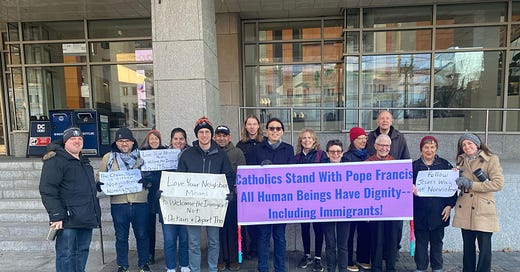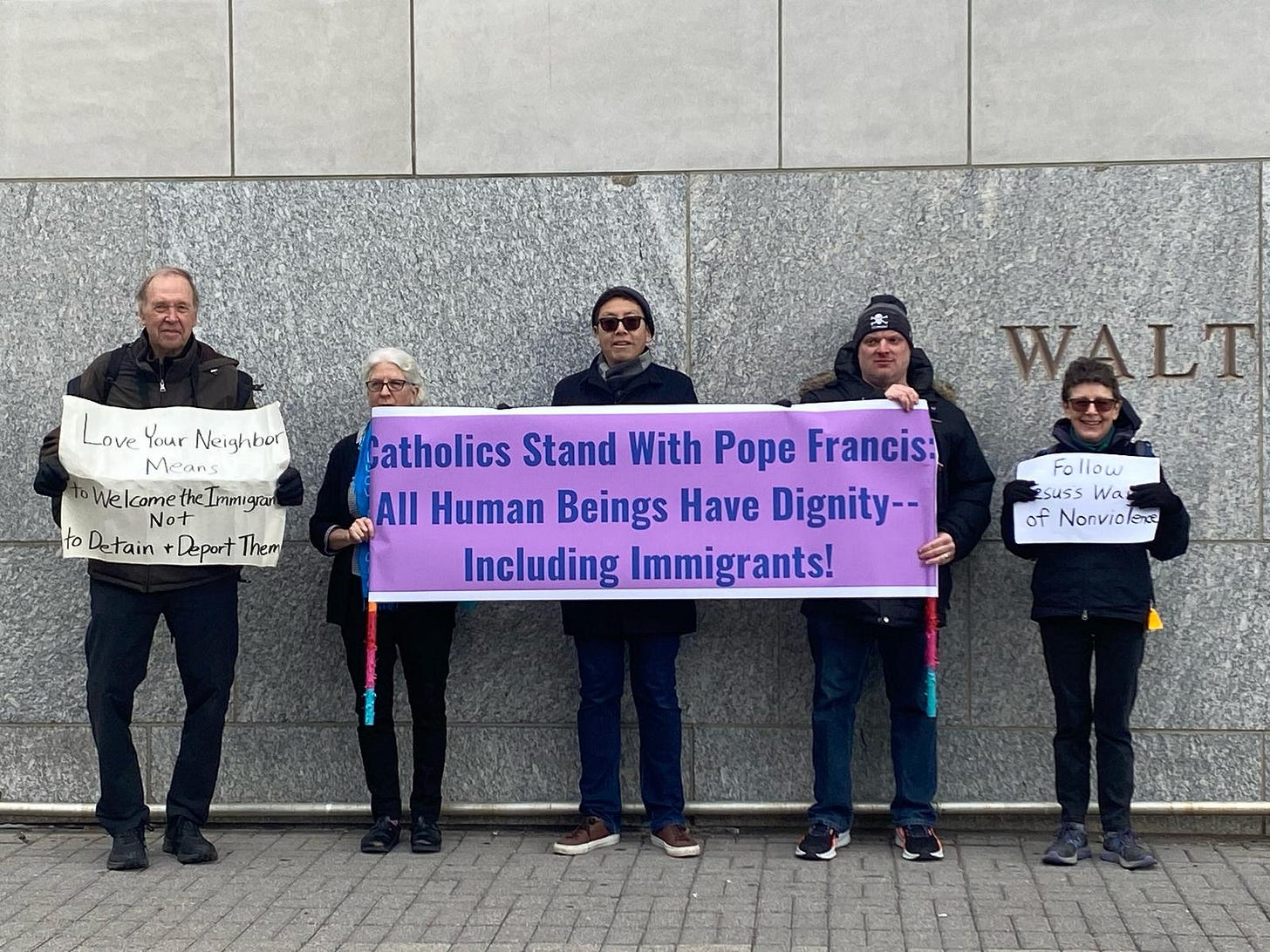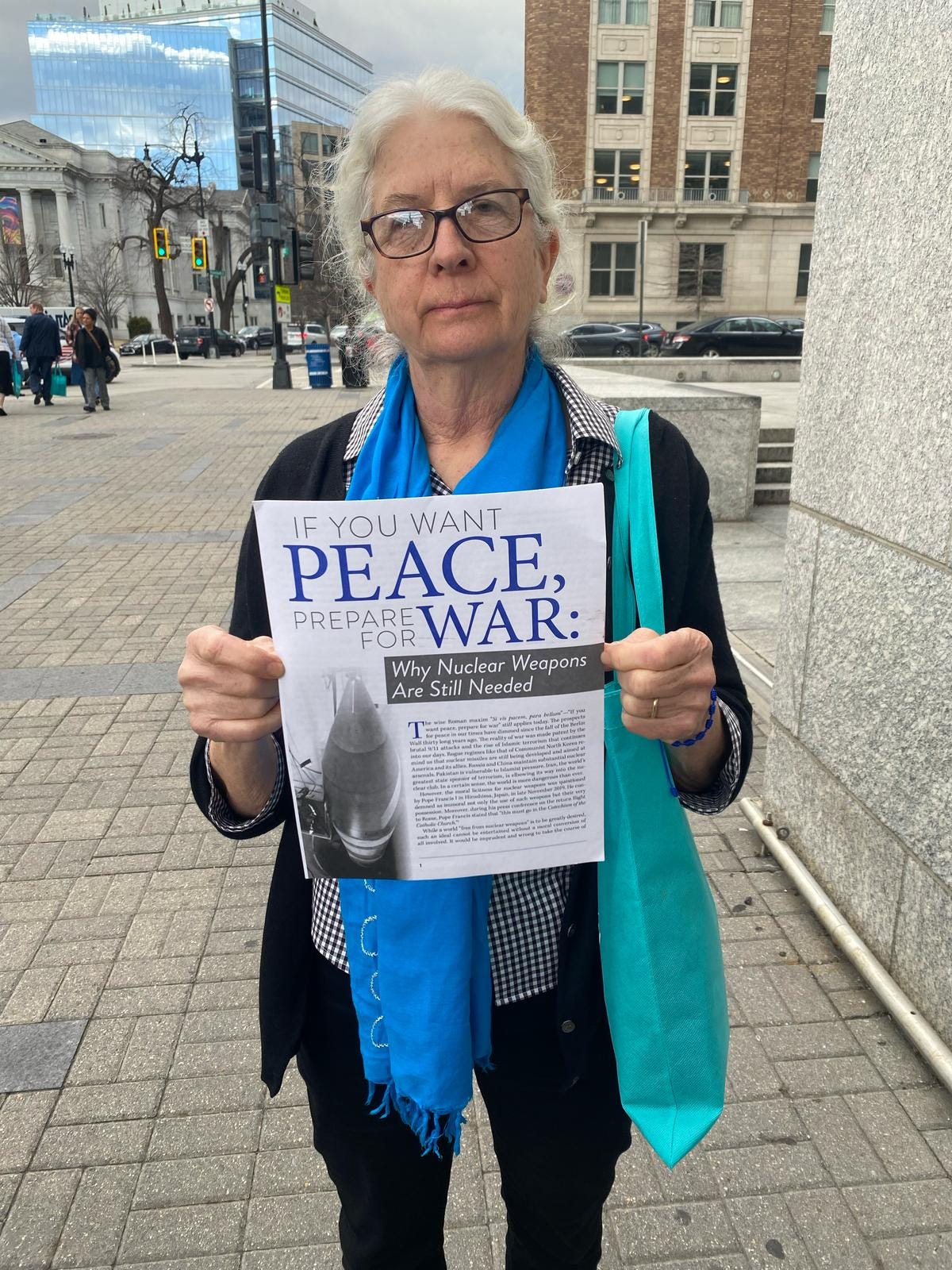Catholic Workers Vigil as Vice President Vance Addresses the National Catholic Prayer Breakfast
Martha Hennessy reports back on J.D. Vance's talk at the National Catholic Prayer Breakfast
Last Friday, Martha Hennessy, (of Maryhouse Catholic Worker, New York City) attended the National Catholic Prayer Breakfast in Washington, D.C., and shared her experience there with Roundtable.
As Martha Hennessy observed the breakfast’s proceedings inside, a group of about two dozen Catholics—several Catholic Workers among them—stood outside the event in a “solidarity vigil” with her, as Art Laffin, of the Dorothy Day Catholic Worker in Washington, D.C., described it.
Over the course of three hours, their numbers ebbed and flowed. By the vigil’s end, five witnesses continued to hold up signs of protest as the motorcade of the Vice President—and speaker at the event—J.D. Vance departed.
As Martha shares in her essay, the message of the prayer breakfast, ironically, mirrored the message of the Catholic Worker. Missing, crucially, was the Catholic Worker’s critique of war and empire.
As she contemplated the moment of national moral crisis the breakfast addressed, Martha reflected that it is the witness of houses of hospitality—the welcoming of the poor, the solidarity with the marginalized, the refusal to live through exploiting another’s livelihood or taking another’s life—that speaks most eloquently to the needs of the current moment.
peace,
Renée
Inside the 2025 National Catholic Prayer Breakfast
by Martha Hennessy
-Washington, D.C.-
Last Friday marked the twentieth anniversary of the National Catholic Prayer Breakfast. Since 2005, the National Catholic Prayer Breakfast has been held in Washington, D.C. to “fortify the Church” in Washington, D.C.
This year’s event boasted 1,400 attendees, a large enough gathering that it was held at the D.C. Convention Center. At the last minute—just three days before the event—it was announced that the guest speaker would be Vice President J.D. Vance.
Why did I attend? Perhaps it relates to “loving one’s enemy,” meeting them in order to better understand them. I thought I might raise a protest in response to the Vice President’s remarks, but, as I listened, I found myself reluctant to interrupt Vance’s talk.
Our culture is so polarized it seemed that shouting would only reinforce the position of Catholics who are invested in a Christian theocracy and are actively working for it in the nation’s capital. And, I even felt a sense of Mr. Vance’s capacity to repent, to have a turning of heart or change of mind.
Mr. Vance, wearing a blood-red tie, was introduced as a former Marine, Yale law graduate, and a Wall Street broker in technology and finance. He said he believes the Trump administration's policies seek peace and the protection of life: war is not good for Christians, and we must defend Christian religious conscience. He appeared receptive to listening to the concerns of people of faith. He described himself as being imperfect but experiencing transformation daily.
During his talk, he said family is important to him, and he values the concept of the common good for all. He said the duty of religious leaders is to speak to the issues of the day. All in all, he sounded quite smooth and elegant. I felt that I would appear a fool if I was dragged out, protesting his performance.
The vice president ended his talk by recalling Pope Francis’ homily given during the COVID-19 pandemic, of the silence that descended on Rome during that spring of 2020. Vice President Vance joked that, at that same time, he went out and bought rice and ammunition—he had a three-week-old baby at home. The vice president said, in a time of adversity and crisis, he hoped to be the kind of leader to help “bring anti-bodies” into the body public for the care of the common good.
But his words did not hint at what the impact of actual policies will have on real people.
After the Vice President’s address, guests had time to browse the accompanying exhibit hall called “Catholic Works.”
While browsing through the Catholic Works exhibit hall, I picked up a booklet titled “If You Want Peace, Prepare for War, Why Nuclear Weapons Are Still Needed”. TFP, the American Society for the Defense of Tradition, Family, and Property produced the booklet.
The American Society for the Defense of Tradition, Family and Property™ (TFP™) contributed much of the literature to the Catholic Works exhibit hall. TFP is comprised of lay Catholic Americans “concerned about the moral crisis shaking the remnants of Christian civilization.”
In the booklet, the language of empire was employed, considered a “wise Roman maxim,” and viewed as quite applicable to today’s politics. It also quoted a Pope Pius XII article from 1954 concerning just war doctrine on “the legitimate use of nuclear weapons.” Losing the Faith, in these documents, seemed to. be presented as a greater evil than total nuclear destruction, better “dead than red.”
In other words, other nations consist of criminals without a conscience, and our nation is given God’s mandate to oppose this: we are the ones anointed to save the world. The arguments are the nation-state’s distorted echo of the Catholic Worker belief that it is better to break unjust laws than to abandon our faith by accepting endless war.
One of the breakfast’s sponsors, Franciscan University of Steubenville’s new “Homeland Mission” in Washington, D.C., offers Franciscan University students the opportunity to live and study in Washington, D.C., preparing them to be “joyful disciples in the public square,” according to the university’s website. Their literature encouraged young Catholic students to “get out of the boat and walk on water.” The mission, which opened on February 28, the same day as the breakfast, was made possible by a $10 million gift from Ward Fitzgerald, founder of a real-estate venture capital fund.
The Heritage Foundation, the institute that authored Project 2025, was another contributor to the prayer breakfast.
The Catholic Prayer Breakfast appeared, in short, a lobbying arm that advocates for an uneven application of Catholic social and moral teachings to public life: no abortion, retaining the nuclear arsenal, outlawing flag burning, opposing socialism, defending traditional marriage, and fighting the Culture War. Poverty, violence, a permanent war economy, subservience of women, and this “Christian nation’s” legacy of slavery, genocide and white supremacy have no relevance to the moral crisis we find ourselves in, according to this breakfast. The disingenuousness, the self-delusion, left me with a cold chill.
Rather, is this moral crisis we find ourselves in not concerned primarily with the Confessing Church, the nonviolence of Christ, and the choosing of life, abundant for all?
Contrary to the witness of the prayer breakfast, the witness of houses of hospitality becomes ever stronger in these precarious times.
Martha Hennessy is the seventh grandchild of Dorothy Day. She is a retired occupational therapist with nine grandchildren of her own. Martha divides her time between family and farming in Vermont, and volunteering at Maryhouse Catholic Worker in New York City, the same house where her grandmother passed away in 1980.
The order of the day
is to talk about the social order.
Conservatives would like
to keep it from changing
but they don’t know how.
Liberals try to patch it
and call it a New Deal.
[…]
I want a change,
and a radical change.
I want a change
from an acquisitive society
to a functional society,
from a society of go-getters
to a society of go-givers.
— Peter Maurin, October 1934 The Catholic Worker
About us. Roundtable covers the Catholic Worker Movement. This week’s Roundtable was produced by Renée Roden and Jerry Windley-Daoust.
Roundtable is a publication of catholicworker.org and independent of the New York Catholic Worker or The Catholic Worker newspaper. Send inquiries to roundtable@catholicworker.org.
Subscription management. Add CW Reads, our long-read edition, by managing your subscription here. Need to unsubscribe? Use the link at the bottom of this email. Need to cancel your paid subscription? Find out how here. Gift subscriptions can be purchased here.
Paid subscriptions. Paid subscriptions are entirely optional; free subscribers receive all the benefits that paid subscribers receive. Paid subscriptions fund our work and cover operating expenses. If you find Substack’s prompts to upgrade to a paid subscription annoying, email roundtable@catholicworker.org and we will manually upgrade you to a comp subscription.








"During his talk, he said family is important to him, and he values the concept of the common good for all. He said the duty of religious leaders is to speak to the issues of the day. All in all, he sounded quite smooth and elegant. I felt that I would appear a fool if I was dragged out, protesting his performance."
You were correct. Here is what Jim Forest said about "prophetic actions":
"Both Dorothy and Merton were firm believers in patient efforts simply to communicate to others what the Gospel is all about, what the Church teaches, and the value of paying attention to saints who in various ways set a timely example. This is not so much carrying out what are sometimes called “prophetic actions” as engaging in ordinary acts of communication. While being patient and even supportive of me and others who engaged in such dramatic acts of civil disobedience as breaking into draft offices and burning draft files, neither Dorothy nor Merton recommended such tactics as a method of protest." (Jim Forest at the Catholic Peace Fellowship Conference in South Bend, Indiana, on 24 March 2007)